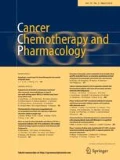Abstract
Purpose
Hedgehog (Hh) pathway signaling has been implicated in prostate cancer tumorigenesis and metastatic development and may be upregulated even further in the castration-resistant state. We hypothesized that antagonism of the Hh pathway with vismodegib in men with metastatic castration-resistant prostate cancer (mCRPC) would result in pathway engagement, inhibition and perhaps induce measurable clinical responses in patients.
Methods
This is a single-arm study of oral daily vismodegib in men with mCRPC. All patients were required to have biopsies of the tumor and skin (a surrogate tissue) at baseline and after 4 weeks of therapy. Ten patients were planned for enrollment. The primary outcome was the pharmacodynamic assessment of Gli1 mRNA suppression with vismodegib in tumor tissue. Secondary outcomes included PSA response rates, progression-free survival (PFS), overall survival (OS) and safety.
Results
Nine patients were enrolled. Gli1 mRNA was significantly suppressed by vismodegib in both tumor tissue (4/7 evaluable biopsies, 57%) and benign skin biopsies (6/8 evaluable biopsies, 75%). The median number of treatment cycles completed was three, with a median PFS of 1.9 months (95% CI 1.3, NA), and a median OS of 7.04 months (95% CI 3.4, NA). No patient achieved a PSA reduction or a measurable tumor response. Safety data were consistent with the known toxicities of vismodegib.
Conclusions
Hh signaling, as measured by Gli1 mRNA expression in mCRPC tissues, was suppressed with vismodegib in the majority of patients. Despite this pharmacodynamic response that indicated target inhibition in some patients, there was no apparent signal of clinical activity. Vismodegib will not be developed further as monotherapy in mCRPC.




Similar content being viewed by others
References
Jia J, Jiang J (2006) Decoding the Hedgehog signal in animal development. Cell Mol Life Sci 63(11):1249–1265
Evangelista M, Tian H, de Sauvage FJ (2006) The hedgehog signaling pathway in cancer. Clin Cancer Res 12(20 Pt 1):5924–5928
Karhadkar SS et al (2004) Hedgehog signalling in prostate regeneration, neoplasia and metastasis. Nature 431(7009):707–712
Suzman DL, Antonarakis ES (2015) Clinical implications of hedgehog pathway signaling in prostate cancer. Cancers (Basel) 7(4):1983–1993
Chen M et al (2009) Androgenic regulation of hedgehog signaling pathway components in prostate cancer cells. Cell Cycle 8(1):149–157
Shaw G et al (2008) Hedgehog signalling in androgen independent prostate cancer. Eur Urol 54(6):1333–1343
Efstathiou E et al (2013) Integrated Hedgehog signaling is induced following castration in human and murine prostate cancers. Prostate 73(2):153–161
Ibuki N et al (2013) TAK-441, a novel investigational smoothened antagonist, delays castration-resistant progression in prostate cancer by disrupting paracrine hedgehog signaling. Int J Cancer 133(8):1955–1966
Mimeault M et al (2007) Improvement of cytotoxic effects induced by mitoxantrone on hormone-refractory metastatic prostate cancer cells by co-targeting epidermal growth factor receptor and hedgehog signaling cascades. Growth Factors 25(6):400–416
Nanta R et al (2013) NVP-LDE-225 (Erismodegib) inhibits epithelial-mesenchymal transition and human prostate cancer stem cell growth in NOD/SCID IL2Rgamma null mice by regulating Bmi-1 and microRNA-128. Oncogenesis 2:e42
Kim J et al (2010) Itraconazole, a commonly used antifungal that inhibits Hedgehog pathway activity and cancer growth. Cancer Cell 17(4):388–399
Antonarakis ES et al (2013) Repurposing itraconazole as a treatment for advanced prostate cancer: a noncomparative randomized phase II trial in men with metastatic castration-resistant prostate cancer. Oncologist 18(2):163–173
Scher HI et al (2008) Design and end points of clinical trials for patients with progressive prostate cancer and castrate levels of testosterone: recommendations of the Prostate Cancer Clinical Trials Working Group. J Clin Oncol 26(7):1148–1159
Shaw G, Prowse DM (2008) Inhibition of androgen-independent prostate cancer cell growth is enhanced by combination therapy targeting Hedgehog and ErbB signalling. Cancer Cell Int 8:3
Acknowledgements
We are grateful to the patients and their families for enrolling in this clinical trial and continuing to advance the treatment of prostate cancer.
Funding
This work is partially funded through support by NIH Grant P30 CA006973 and the ASCO/CCF Young Investigator Award, and by Genentech.
Author information
Authors and Affiliations
Corresponding author
Ethics declarations
Conflict of interest
ESA has served as a paid consultant/advisor for Janssen, Astellas, Essa, Sanofi, Dendreon, Merck and Medivation; has received research funding to his institution from Genentech, Novartis, Astellas, Sanofi, Dendreon, Bristol Myers Squibb, Janssen, Johnson & Johnson, Medivation, Merck and Tokai; and is a co-inventor of a biomarker technology that has been licensed to Tokai.
Human and animal rights
All procedures performed in studies involving human participants were in accordance with the ethical standards of the institutional and/or national research committee and with the 1964 Declaration of Helsinki and its later amendments or comparable ethical standards.
Informed consent
Written informed consent was obtained from all individual participants included in the study.
Electronic supplementary material
Below is the link to the electronic supplementary material.
Rights and permissions
About this article
Cite this article
Maughan, B.L., Suzman, D.L., Luber, B. et al. Pharmacodynamic study of the oral hedgehog pathway inhibitor, vismodegib, in patients with metastatic castration-resistant prostate cancer. Cancer Chemother Pharmacol 78, 1297–1304 (2016). https://doi.org/10.1007/s00280-016-3191-7
Received:
Accepted:
Published:
Issue Date:
DOI: https://doi.org/10.1007/s00280-016-3191-7



